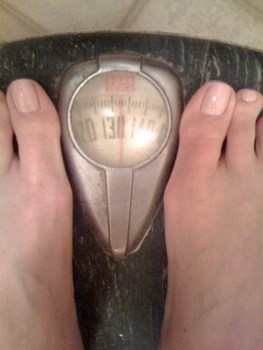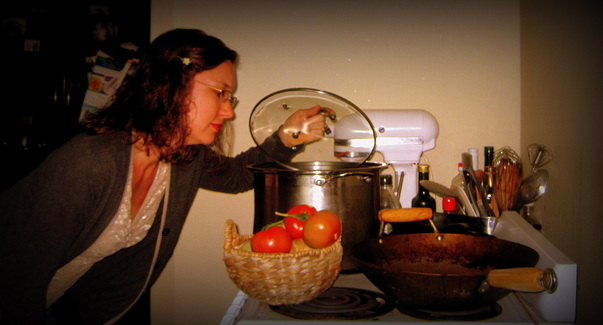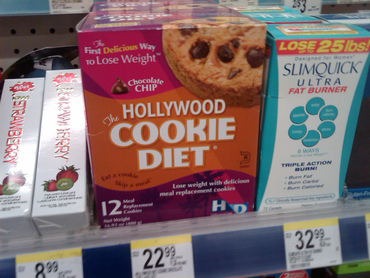 So back in my "Nutrition 101" days of my Naturopathic medical education, I learned the commonly taught old school nutrition idea of: "weight loss = more calories burnt than consumed" So that's it, huh? Eat less calories, burn more calories and weight loss will be a sure thing? Well, most of us know it's just not that easy. In fact, many find that they gain weight during and after dieting, even if they increase their activity level. So what's going on?! The fact of the matter is, only 1 in 6 dieters keeping the weight off (after a year). So why can't we all just follow that easy formula and lose those extra pounds?! ...because it just isn't so simple. We are a little more complex than calorie consuming and burning machines (but you probably knew that already). An article published last week in the Journal of the American Medical Association provides a little insight into some of those dieting and weight loss complexities. The publishing authors looked at overweight research participant using three different diet and weight loss programs and measured their success. The three diets were low-fat, low glycemic and low carbohydrate (high protein). Under carefully monitored in-patient hospital settings, the low glycemic dieters burned an average of 200 calories per day more than the low fat. The low carbohydrate dieters lost 300 calories more per day than the low fat dieters but saw an increase in blood levels of inflammatory markers (cortisol and CRP). So what does this all mean?! Just follow the diet where people burned the most calories while being constantly monitored in the hospital? Well, that doesn't sound like a very enjoyable diet program to me. If you're considering a weight loss-focused diet and exercise program, think about getting an expert involved to guide your path to success. If you haven't heard by now, my past 'slim down & happy up' program sessions have provided women (& men) with guided, individualized meal planning, diet guidelines and exercise recommendations. Combined with unique natural formulas that I craft specifically to each participant, this really is my all-in-one tool to address weight loss and stress reduction for long-term success. Registration for our next session opens Monday, August 19th, full details here. Join us for 3 months, and just see what a profound impact you and I can have on your health and quality of life!
0 Comments
There are so, so many things that I despise about all the popular nationally-known diets. If it involves meal replacement shakes, points or counting anything, I probably hate it.
From ‘slim down & happy up”: A lot of well-known weight loss programs have good intentions but poor execution. A calorie restricted diet is a common strategy. Calories in, calories out, right? We just get you to eat less and work out more, and the pounds will fly right off, right? Nope. It’s not that simple. So let’s highlight one very popular weight loss strategy: portion control. Blech. Even saying “portion control” makes me uncontrollably contort my face like these kiddos (except the yogurt girl; I’m pretty sure I’ve never looked that cute). “But, Dr. Angela, shouldn’t you be all for portion control since you help women lose weight?” You would think, but no, no I’m not. Because food selectivity is much more important than portion control. While helping women lose weight through slim down & happy up, we talk so very much about our food choices, and leave grams, calories and servings to those other guys. I actually find that both slender and overweight women alike tend to under-eat- I more commonly advise women to eat more food rather than to scale it back. We should be more mindful of what you’re eating, and less about how much. Women in ‘slim down & happy up’ eat until they are full, breakfast, lunch and dinner. And how is that? How am I assisting in weight loss without counting calories, points or replacing meals with shakes? Well, that takes a while to explain. Five weeks, to be exact. Never fear, registration is now open for the next session of ‘slim down & happy up.’ We’re starting June 27th, so you’ll have to get on board before then! Oh, and to get a private discount code for this current session, sign up above to get on my contact list. Here’s to eating to your fill, Yep, I’m anti-grazing. “I need to eat every 2 hours, or I just faint, get grouchy, become homicidal, start eating dirt, etc.” I’ve heard it countless times. I used to say it myself. But where did we ever get the idea that that was normal? Let alone healthy? Feeling like you will pass out or go crazy if you don’t eat every two hours is not healthy. I don’t let that slide. Why? Why do I care so much because you eat kale and grass-fed lamb and organic walnuts every two hours? Because I care about you and your hormones. Yes, it’s back to hormones again. This time, those responsible for the endless grazing cycle loop are insulin and cortisol (and also a dozen other digestive hormones and other neurochemicals). A major part of the grazing addiction is blood sugar instability. Blood sugar roller coasters, lead to off-the-wall insulin responses and set you up to need to graze constantly. A stable, healthier blood sugar response, on the other hand, allows for the best use of calories, including fat burning. That means grazing (and their wacky blood sugar patterns) can actually lead to weight gain- the very thing that grazers often are trying to avoid! As I explain it in ‘slim down & happy up’: insulin excess + insulin spikes = belly fat Guess what else happens when blood sugar responses go from crazy-roller-coaster to nice-and-smooth? Stress goes down because cortisol (the stress hormone) will decline naturally. Wanna learn how to break the grazing cycle and reduce stress? An added bonus just might be losing a little belly fat in the process. Registration is now open for ‘slim down & happy up,’ my way to target weight loss through stress reduction (and get those pesky hormones under control for once!)- so sign up now while you still have time. If you aren’t already on my contact list, sign up and receive a private discount code for this current session. We begin in a few weeks- don’t get left behind! Here’s to helping you de-stress,  cook smarter, stress less ...you gotta eat, so why not upgrade your kitchen time? do you... ...struggle with trying to cook homemade food without spending all your time in the kitchen? ...stare into your fridge for long minutes, with only mustard and bare shelves staring back at you? ...want to eat healthier lunches at work, but never cook ahead of time, so you end up eating out more often than you'd like to admit? (warning sign #1: the fast food clerk knows your name and order) if so, then join Dr. Angela on this free 3 day workshop and find out how to... ...structure your kitchen time for minimal prep and maximal meal production ...eat better, cook smarter and stress less over your food choices ...learn how to keep your fridge stocked with healthy meals and snacks ...and get a few bonus recipes to help you get started, now! join me from the comfort of your pjs Register for the workshop now (it takes 2 seconds), then sit back and follow along as the entire course is sent to your inbox through my short course on upping your kitchen game. Each day will bring a new e-booklet to your inbox, so you can read and follow along at any time. so what's the cost? For all this love, time, and organization, I'm bring you Let's Get Cooking for free ...but only if you sign up now through June 9th alright, so when do we start? Let's Get Cooking runs Monday June 10th to Wednesday June 12th. Sign up today to save your spot. If you have a friend who also needs some kitchen intervention, pass this link along and Get Cooking together!  I love HeartMath. It's the only computer program that I can think of that I'd call a life saver. Others are useful, helpful or necessary for business operations. But not live savers. HeartMath is. It's for real. Myself and all my formerly-stressed-out patients who have experienced the biofeedback training using the HeartMath system can attest to this. At first, there was the emWave as a desktop or handheld version. I use the desktop version with myself and my patients (I do practice what I preach!). I usually have one or two handheld devices on hand for those patients who are most eager and committed to relieving their stress that they enthusiastically continue biofeedback training in their own time away from my office. Then a month ago I learned about the Inner Balance Sensor: the next generation version for the iPhone, iPad and iTouch. Check out the video all about it, and get brushed up on this innovative technology in under 3 minutes. It turns iPhones into biofeedback devices. That is seriously cool. Anyone can now access and use this technology in their daily lives. I've long been looking for a way to bring my in-office biofeedback sessions on the road. It's difficult to explain in words a concept that's instantly understood by just watching and experiencing biofeedback in action. Now when I'm out and about at meetings, presentations and other public events, I'll be able to fire up my iPad and have a scaled-down version ready to demonstrate on demand. I recently saw that Dave Asprey, the Bulletproof guy, recently endorsed the Inner Balance Sensor as well as provided a very comprehensive overview of how it works. He's known for dismantling the entire way that we eat, and reconstructing his Bulletproof diet based entirely on research findings for optimal human performance and activity. Check out his diet guidelines, they're pretty spot-on. As Dave Asprey's writings can be trusted to be firmly rooted in the scientific research, his articles are well worth a read: How to Biohack Your Courage, How HeartMath Training Helps You Live Longer, and Six Ways To Hack Your Nervous System. His theme is "biohacking" your body's physiology through the use of science, if you can't tell.
Well, that's my exciting news today, though there's much more in the works. But that will be exciting news for another day. To your good health, Absolutely nothing. Ok, so that's not entirely true. But 99.9% of reactions to stress nowadays are harmful and unnecessary. Here's a whirlwind tour on what stress is doing to you and your body, why it sucks, and what you can do about it to have a happier, more kick ass life. Most of us have heard that the physiologic (body) response to stress has evolved to run away from woolly mammoths or saber tooth tigers or something along those lines. Well, ok, great, but we were also club-swinging unibrow-sporting troglodytes (word of the day for ya). Things have changed. So why on earth would morning traffic and work deadlines cause the same effects in your body as a near-death experience as the hands (or claws?) of a neolithic lion? Because, for the most part, deep deep down in your genes and cells, not much has changed. You're still living, breathing and metabolizing like its 1999. B.C that is. And what is stress and who defines it anyways? What cranks one person's stress-o-meter up to 11 (public speaking anyone?), is exciting, challenging and enjoyable to another. Well, the million dollar answer is: that person, thing, event or activity that is "stressful" is only stressful because you're responding stressfully to it. Ok, before I go too esoteric and off into "what is is" land, let me break it down another way: stress as a word was not created to describe a human physiologic response. It came from civil engineering, and only afterwards did biology researchers take the idea and apply it to the human body. Stress is a force from the outside that is exerting its effects in you (or a bridge, but why split hairs). Or to quote the never-wrong wikipedia, "stress is a measure of the internal forces acting within a deformable body." Sexy definition, right? So something is trying to deform your body (boss breathing down your neck, kids going nuts, no time to yourself) and stress is the amount those things are affecting you, internally. But. But. The real kicker of all this is you have a choice in the matter. You can choose how all those external forces affect your internal forces and deform your body. (ok, I'll stop with the engineering talk) There are many ways you can respond physiologically (and emotionally) to potentially stress-inducing events and interactions. How do you respond? Crack like an eggshell? Crumble like saltine?
How do you want to respond? Bounce back from any hardship like a superball? Nonchalantly and gracefully move from one project to the next like a slinky? You may have minimal influence over commuter traffic, paying the bills and having a ever-expanding to do list with never enough time-- but what you do have maximal influence over is your response. This is more than a matter of "just think good thoughts" or "quit your job and move to Fiji" (though if you're looking to take a concierge doctor to Fiji with you, let me know). I work with people to build up their internal reserves so that they can react to life more like a slinky and less like an eggshell. Getting and maintaining that attribute is a process (unless you do just move to Fiji)- but one that when working together, I have always seen stress diminish, anxiety dissolve and positivity and resilience grow in their place. And from that standpoint, you can take on the tigers and bosses without losing your cool. To your good health, Ninety percent (90%!) of cancers have preventable causes. Here's a quick "What are my chances of getting cancer" quiz. Count up your points for these health factors. Do you: Exercise? Yes= 0 Sometimes=1 Never=2 Smoke? No=0 Used to=1 Yes=2 Drink alcohol? No=0 More than 2 a day=2 Get checked for STIs? Yes I have=0 No or "What is that?" =1 Eat fast food? No=0 Occasionally=1 Daily=2 Have exposure to any of these known carcinogens (means cancer-causers). One point for each: radiation exposure (occupational or many, many X-rays), polluted water, chemical or industrial toxin exposure (such as from your occupation or living nearby a chemical plant) and a history of bad (blistering) sunburns. Now, if you didn't notice the pattern above, this is not the SATs. More points is not better- it's worse off for your cancer risk. And since 95-98% of all cancers are not genetic (inherited and perhaps inevitable), then that means there's ample time and resources for cancer prevention. Take a look at this engaging infographic from Rock Your Cause and see your nearest preventive medicine doc and cultivate your health for now and decades to come. Contact me for more, or feel free to email me day or night at [email protected]. Be healthy, well and happy. And remember, "prevention is the best cure."
There are over 300,000 people in the US who suffer a stroke each year, especially those with a personal and/or family history of heart disease, diabetes and clotting disorders. The aftermath is uncertain and often ranges from paralysis to difficulty speaking and other far-reaching effects. Since the damage is already done by the time someone knows they have a stroke, prevention is key for this potentially devastating disease. Research published last week in the British Medical Journal found that those who ate fish 2-4 times a week had a 6% less chance of a stroke, and those who ate fish 5 times a week had a 12% less chance of having a stroke. Fish has been long recognized as an "anti-inflammatory" food, meaning that it reduces, rather than stimulates an aggravation of your immune system when you eat it. Just remember, that there is a wide diversity of fish out there, and be cautious in your choices.
Wild-caught Alaskan salmon, for example, has higher amounts of Omega 3 fatty acids and bioflavonoids than farmed Atlantic salmon- which is "pinked up" by artificial dye to look as healthy and fresh as its wild counterpart. And when considering species of fish and fishing practices, over fishing and other environmental concerns (not to mention heavy metal content such as Mercury), it can at first be difficult to find a healthy source of fish that you feel good purchasing. Take a look at Environmental Working Group's Safe Fish List and this Sustainable Seafood Shopping Guide for pointers, recommendations and further reading. Here's to your good health. So how nutritious is your food? How much calcium, vitamins and iron do you really get out of your food? And how's a person supposed to know? Well, if you look to the CDC's recent release of their seven-year long project, the National Health and Nutrition Examination Survey, then there's not much to worry about. On average, only 1 to 10% of those tested were nutritionally deficient in any given vitamin or mineral. But how can you know? How do you know if you get enough folate or omega-3 fatty acids? And how much does your food contain, anyways? Do we need vitamin and mineral supplements? To summarize my answer to these and many more questions, please take a few minutes and view this highly informative, engaging and inspirational video by Dr. Terry Walhs MD. Since whole organic fruits and vegetables are where it's at, recently I was inspired to create a lunch that Dr. Walhs would approve of. Seen below, it's a garden salad and sauteed vegetables, complete with many colors and sulfur-containing foods. So if you don't get enough nutrients from your food alone, how can you tell? In developing countries and areas where access to food is limited, the types of malnutrition seen there (e.g. poor development, brittle hair and teeth) is much more severe than the insidious type seen in America: overweight and overfed but nutritionally poor diet. I would call this nutritional insufficiency. What can that look like? Some one lacking in one or more of our basic vitamins and minerals may experience headaches, poor concentration, low stamina, poor wound healing, many different skin complaints, tension, nervousness, depression and/or low energy. Might you know any one with one or more of these complaints?
Let me know any specifics I can answer on the above raised topics or feel free to write below any responses this topic raises. I am eager to answer readers' questions, but as always, the material here is no substitute for careful and conscientious medical advice. Naturopathic physicians are experts at dietary analysis and can identify unique nutritional deficiencies or insufficiencies you may have. This is after taking into consideration any one of a number of common complaints which are seen as "normal" but may in fact be easily treated with a few simple dietary changes. Please check in with your local ND for concerns specific to your situation. Has science left common sense eating in the dust? When I see Cherry 7-Up Antioxidant advertising "A Delicious Cherry Way to Pick Your Antioxidant.," it seems that science, any science whatsoever, trumps common sense. When you have no idea how your food is made, as is the case with pretty much all processed food, you leave your health in the hands of companies such as Pepsi-Co. Personally, I do not trust that these companies have my health in mind when they're advertising the antioxidant power of soda pop. So, if Pepsi-Co won't look out for our best health, who will? You will. And if the old adage is right, that we are what we eat, then what should we eat? Well, I for one was not created in a lab, so why would lab-created food be best for me? It wouldn't. What is "whole food?" I like to think of it as food you can identify. Meat, vegetables, fruit. What isn't whole food? Food that you have no idea how it was created. If you're squinting to make out the ingredient names (if you're looking at the ingredients list at all), you're probably not eating whole food. And if you're not eating whole food, then you're eating part food and part chemicals, at a greater cost. A whole chicken and rice (or beans or potatoes) will always cost a family less than Combo/Value/Kid's Meals for everyone at a fast food establishment. And what kind of sense does that make? If you want to read more on this, one place to look is Michael Pollan. I've taken the liberty to condense his already condensed "7 Rules for Eating" to the phrase: "Real Food, Not too Much, Not too Fast." See WebMd's page on him as a springboard into this topic.
Thank you for reading. I always appreciate your comments and questions! |
Archives
June 2024
Categories
All
|
about the doc |
patient infocontact |
|
Privacy Policy
© Copyright 2011-2024, Dr. Angela Cortal ND LLC website content is for educational purposes only and is no substitute for medical advice (see the Terms of Use Agreement for this site), you must establish a doctor-patient relationship to receive that! |









